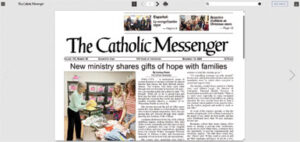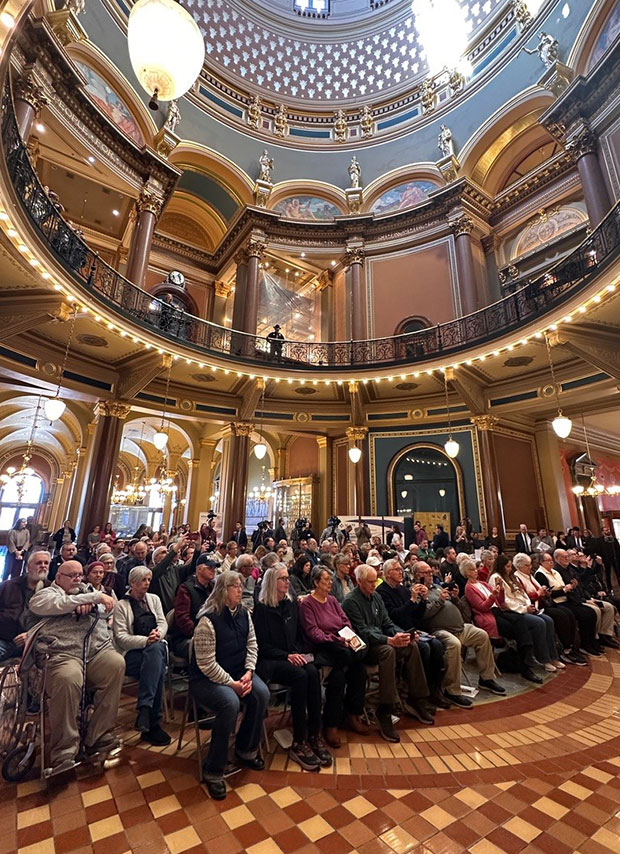
People listen during the Prayer for Life at the State Capitol in Des Moines Jan. 27.
By Barb Arland-Fye
The Catholic Messenger
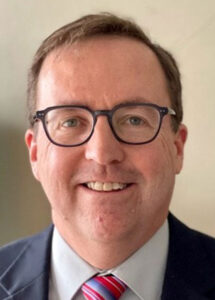
Tom Chapman makes a point of talking with both Republican and Democrat lawmakers in his role as executive director of the Iowa Catholic Conference (ICC), the public policy and advocacy group for Iowa’s bishops. Issues of importance to Iowa’s Catholics do not fit neatly within either political camp, he told participants Jan. 30 during a webinar, “Advocating for Justice 2025.”
The webinar focused on the legislative process and issues of concern to Iowa’s bishops at the state level and the U.S. Conference of Catholic Bishops (USCCB) at the national level
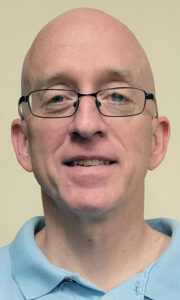
in the early weeks of the 2025 legislative sessions. Social Action Director Deacon Kent Ferris of the Diocese of Davenport and Social Justice Director John Huynh of the Diocese of Des Moines gave brief presentations about their participation in the Catholic Social Ministry Gathering in Washington, D.C. Jan. 25-28.
Chapman led participants in an opening prayer from “Forming Consciences for Faithful Citizenship” (USCCB) that set the tone for the presentations. “… Heal us from our differences and unite us, O Lord, with a common purpose, dedication, and commitment to achieve liberty and justice in the years ahead for all people and, especially those who are most vulnerable in our midst.”
Following prayer, Chapman identified the ICC’s focus: “We advocate for respect for life and the social justice concerns of the Church and for Catholic schools.” He has plenty of experience, now in his 19th year representing the bishops’ concerns to state legislators.
“We do no electoral activity in terms of supporting candidates or parties on behalf of the Iowa Catholic Conference (ICC),” Chapman said. “We’re happy to work with Democrats and Republicans when our interests align. One of my jobs over the past couple of weeks has been to meet with new legislators and there are plenty of new legislators who are Republicans and plenty of Democrats. We try to get to know them a little better, see what they’re interested in and try to do some good work with them.”
Before highlighting state legislative issues that the ICC is following, Chapman asked Huynh and Deacon Ferris to share insights from the Catholic Social Ministry Gathering. Huynh identified three themes from the three presentations that “tie together the Church’s mission in social ministry: our tireless defense of the poor, political action as a form of charity, and the essential role of hope.”
“First, the Church works tirelessly to defend and be a voice for the poor — those who suffer injustice in its many forms,” Huynh said. Cardinal Christophe Pierre, the Apostolic Nuncio to the U.S. who shared a message from Pope Francis, “reminded us that the poor are not only those in material poverty, but anyone deprived of justice.” The cardinal “emphasized that the poor are not just recipients of ministry but agents of evangelization themselves. They, too, proclaim the Gospel, teaching us through their suffering, and in their own way, proclaim the Gospel to us.”
“The second theme is that political action — rightly understood — is a form of charity,” Huynh said, referencing Vatican official Emilce Cuda’s presentation. The “Church’s engagement in politics is not about seeking power — it is about pursuing the highest form of charity through public service and advocacy. Political action is not about aligning with one party or another but about working for the common good, particularly in defense of the most vulnerable. This means moving beyond ideological battles and instead adopting what Pope Francis calls the lens of Jesus Christ — a lens that prioritizes people over politics and justice over division.”
Hope, the third theme, is “the virtue that sustains all our efforts in social ministry,” Huynh said, “that allows us to persist in the work of justice, even when results are slow or obstacles seem overwhelming. Referencing the presentation of Bishop Joseph Tyson of Yakima, Washington, Huynh said, “Hope teaches us that salvation is not an escape plan, but a rescue plan. As ministers of the Gospel, we are called to embody this hope, not as wishful thinking but as a conviction that God’s redemption is unfolding, even in the face of suffering and injustice.”
Deacon Ferris arrived a day early in Washington, D.C., and had the opportunity to witness high school and college students on the March for Life. The back-to-back events reminded him that the Catholic Church takes a “both/and” approach in advocating for life issues. “We take very seriously the responsibility for upholding the dignity of human life from conception to natural death,” he said.
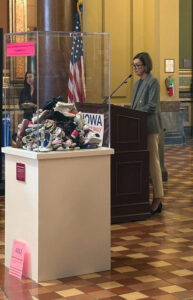
Gov. Kim Reynolds speaks during the Prayer for Life at the State Capitol in Des Moines Jan. 27.
The list of issues the Iowa contingent presented on behalf of the USCCB focused on:
- Tax and budget decisions that help children and families to flourish, especially families experiencing poverty.
- Passage of Fiscal Year 2025 appropriations now, and appropriate funding for international poverty- and hunger-reducing development and humanitarian assistance.
- Humanitarian protections for vulnerable families, including refugee resettlement.
Deacon Ferris emphasized the value of in-person visits with legislators in constituents’ local communities. He encouraged constituents to attend legislative forums in their communities to share their concerns with legislators. These interactions remind legislators that they are public servants who “need to listen to their constituents.”
Chapman shared updates on federal and state immigration policies, noting that the current atmosphere seems to be “giving permission to people to be mean and to bully other people.” He encouraged constituents to contact their legislators to express concerns about any issue and he provided information about action alerts (accessible at iowacatholicconference.org) as one tool to help constituents respond to issues.
Among the state issues that the ICC is following:
- Double Up Food Bucks (SSB 1012). This measure encourages Supplemental Nutrition Assistance Program (SNAP) recipients to purchase fruits and vegetables, promotes healthy eating and supports Iowa’s small farmers.
- Preschool funding. The ICC advocates for funding to allow more children living in poverty to attend preschool, which would also benefit public and private school districts. The ICC also supports a proposal encouraging public school districts to partner with community providers and private preschools.
- Age verification for adult websites (HF 62). This measure would place a greater obligation on adult websites to protect children, Chapman said.
- Fetal development video (SSB 1028 and HSB 34). This measure would require schools to show a research-based, age-appropriate video depicting prenatal human development. “We think this will help students understand the beauty of a baby’s early days and we’re hoping that carries over so that people will understand the dignity of all human beings,” Chapman said.
- Abortion pill black market. These pills are easy to order online without a prescription. “We’d like to make that more difficult. The drugs are risky,” Chapman said.
- Conscience rights for medical professionals. Chapman assured a student group of the Catholic Medical Association that he expects to see a conscience rights bill introduced soon.









